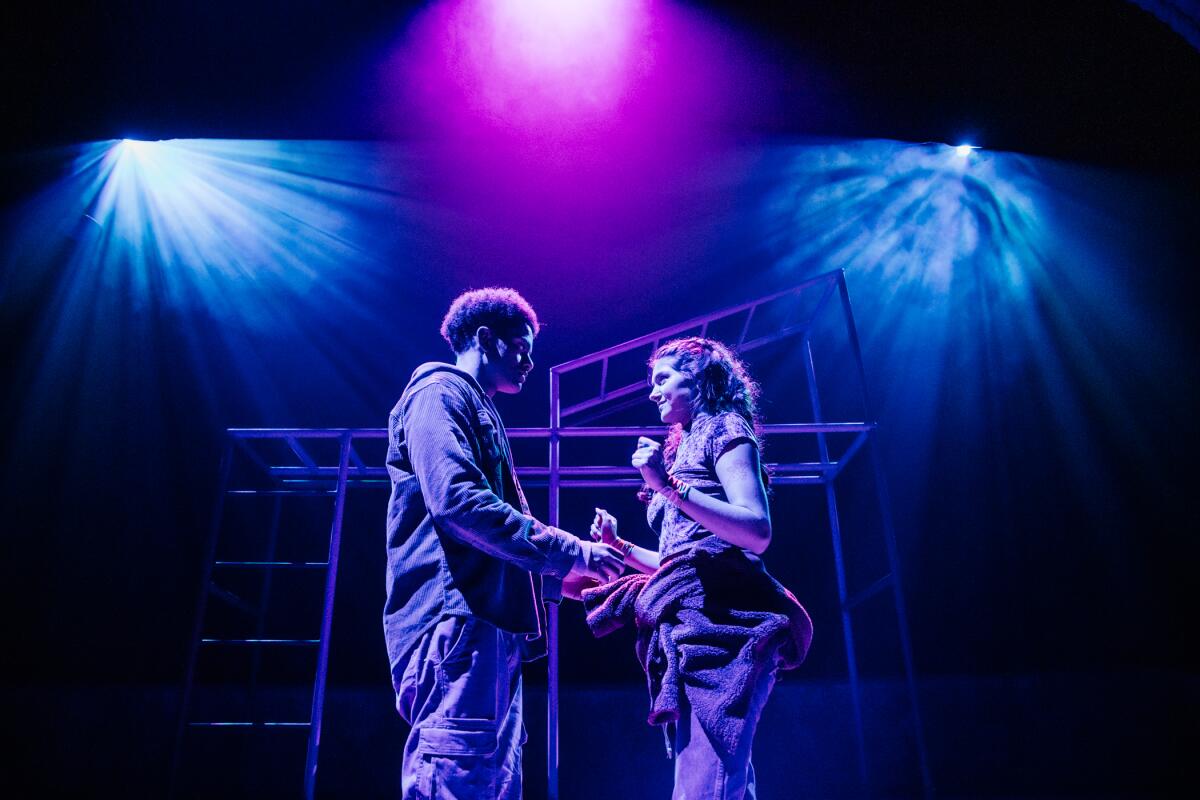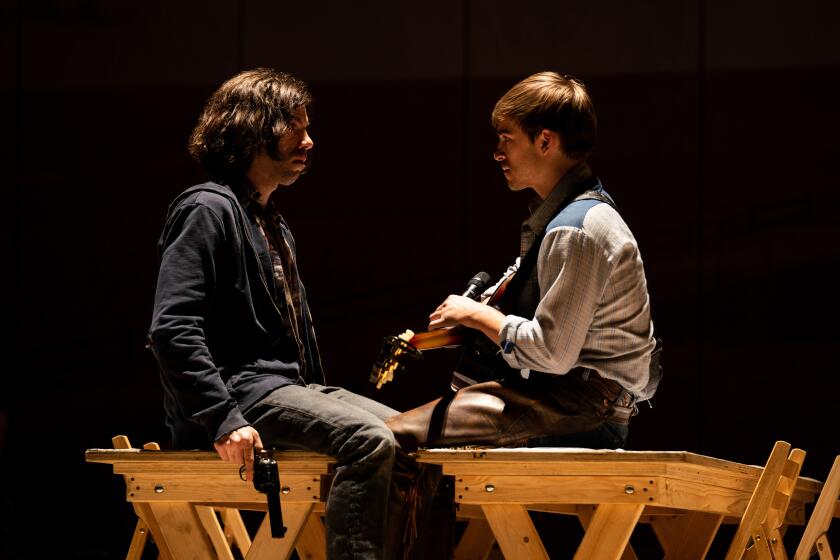Review: ‘Sanctuary City,’ a compassionate tale of post-9/11 undocumented life, is not to be missed

- Share via
The most beautiful sound an audience can make in a theater isn’t applause or even laughter. It’s the audible hush of rapt attention.
At Sunday’s Los Angeles area premiere of “Sanctuary City” at Pasadena Playhouse, you could hear the proverbial pin drop. The engrossed quiet was the direct result of theatergoers hanging onto every word spoken by characters whose stories they had taken to their hearts.
This tense, gripping play by Martyna Majok, Pulitzer Prize-winning author of “Cost of Living,” examines the plight of two young undocumented immigrants who have come to depend on each other for their survival. At once abstract and devastatingly real, the work focuses on the patterns of existence for those living in the shadows of citizenship.
The names and backgrounds of the lead characters are not specified. Majok, who is herself a Polish immigrant, merely states in a note at the top of her script that these “characters have grown up within working class multicultural America.” She requests that they not be played by actors of Western European origin but leaves their identities open to “encourage wider, more inclusive casting across subsequent productions.”
Set in Newark, N.J., in the wake of 9/11, when George W. Bush was president and the war on terrorism was escalating dramatically, “Sanctuary City” is divided into two main parts. The first offers a succession of quick snapshots of the high school years of characters designated in the program as G (Ana Nicolle Chavez) and B (Miles Fowler).
Majok has composed this section in quick bursts of dialogue that are repeated and elaborated in staccato rhythm. The story of G and B is sampled, hip-hop style, and jumps forward and back as a picture of their lives comes into sharper focus.
The puzzle-like nature of the play evokes at times the experimental mode of the great British playwright Caryl Churchill. Majok, however, isn’t trying to blow our epistemological paradigms. Nor is she being willfully enigmatic. She simply wants theatergoers to maintain an active posture in regard to characters who have no choice but to hide.
Daniel Fish’s Tony-winning revival of Rodgers & Hammerstein’s ‘Oklahoma!’ reveals the underside of the American story.
“Sanctuary City” unfolds in glimpses and overheard remarks. Details flash before us, but the larger meanings must be inferred.
G appears on B’s fire escape without a winter coat. She’s freezing and needs a place to sleep. Her body is bruised and she apologizes for leaving blood on his sheets.
Before long, it becomes clear that G’s stepfather is violently abusive. B invents excuses for G to miss school. The flu, a cold, chicken pox, the flu again. She can’t show up with visible marks because teachers will want to investigate and any run-in with the authorities risks deportation.
B’s mother is planning to leave the U.S. The atmosphere since 9/11 has turned threatening. She fears being detained and doesn’t want to imperil her son’s future. But B is already giving up on the prospect of college, despite being extremely bright. Without papers, he’s not eligible for federal financial aid. He sees no path for himself.
Newark is designated as a sanctuary city, but true sanctuary is found only when G and B are alone. Their bond intensifies after B’s mom leaves the country and G moves into the apartment. She brings home food from her restaurant shifts and they pool their money to cover the rent.
The relationship is intimate without being sexual, something G doesn’t fully understand as she curls up beside B in bed. Majok observes without explaining. Is trauma preventing B and G from consummating their love, or has their youthful dependence cast them into sibling roles?
Not knowing propels our interest. There are surprises, which in retrospect seem perfectly accounted for. But it’s better to go in without too much information.
The plot changes rapidly after G announces that she and her mother have obtained citizenship. G has decided to attend college in Boston, something of a surprise given all the school she has missed. B mutely takes in the information. He’s happy for her but can’t help mourning all the opportunities his undocumented status has deprived him of.
By the end of the first half, G is heading off to college with an engagement ring. Her relationship to B is still muddled, but the attachment between them is so deep that they can only say goodbye by proposing marriage as a solution to the disparity of their fates.
The production, which is performed without an intermission, brings the play’s first half to life on a darkened set framed with monkey bars that are as theatrically playful as they are thematically imprisoning. Zi Alikhan’s concentrated staging leans into the abstraction and lets the performers conjure through their deeply felt acting the maze of their perilous adolescence.
The actors never take a wrong step in this section. Chavez’s G can’t conceal her scars. Her resilience is undeterred, but her capacity for joy has been hobbled.
Fowler’s B hasn’t been battered in the same way, but his inner torment will eventually have to be confronted. When that moment belatedly arrives, the emotion flows in a silent torrent.
The play’s second half is furnished with more visual realism. Chika Shimizu’s set design now evokes what Solomon Weisbard’s lighting was tasked with initially establishing — the psychological backdrop of an untenable social reality.
A third character, Henry (Kanoa Goo) enters the picture. Years have passed, leading to a somewhat contrived triangular reckoning. Can love, no matter how selfless, bear the burdens of B’s risky legal status?
The play’s scrupulous plausibility slips a notch in the ratcheting up of this conflict. The mood is Bergmanesque in its unrelenting intensity, but the playwright struggles to land the plane she has navigated until now so expertly.
The ambiguity of the work’s poetic last movement is confused. Is it the rushing train of time that we hear or is it a suggestion of suicide? As excellent as Alikhan’s staging has been throughout, Majok absconds without having to commit herself. In wishing to avoid a pat ending, she falls into grim vagueness. But the truthfulness of everything that has come before cannot be erased. And the plague of American sentimentality has been successfully evaded.
In plays such as “Ironbound” and “Cost of Living,” Majok has given the spotlight to characters who have historically been relegated to the invisible margins. “Sanctuary City” represents a major extension of this noble project. The plight of the undocumented is traced with so much personal gravity that it’s astonishing to realize how much we feel and how little we still know about the characters.
No one who cares about contemporary American drama — or the millions of residents yearning for the ever more elusive American dream from the holding cell of their politicized limbo — should miss this play.
'Sanctuary City'
Where: Pasadena Playhouse, 39 South El Molino Avenue, Pasadena.
When: 8 p.m. Wednesdays-Fridays, 2 and 8 p.m. Saturdays, 2 p.m. Sundays. Ends Oct. 9
Tickets: Start at $35
Contact: www.PasadenaPlayhouse.org or (626) 356-7529
Running time: 1 hour, 45 minutes
More to Read
The biggest entertainment stories
Get our big stories about Hollywood, film, television, music, arts, culture and more right in your inbox as soon as they publish.
You may occasionally receive promotional content from the Los Angeles Times.











